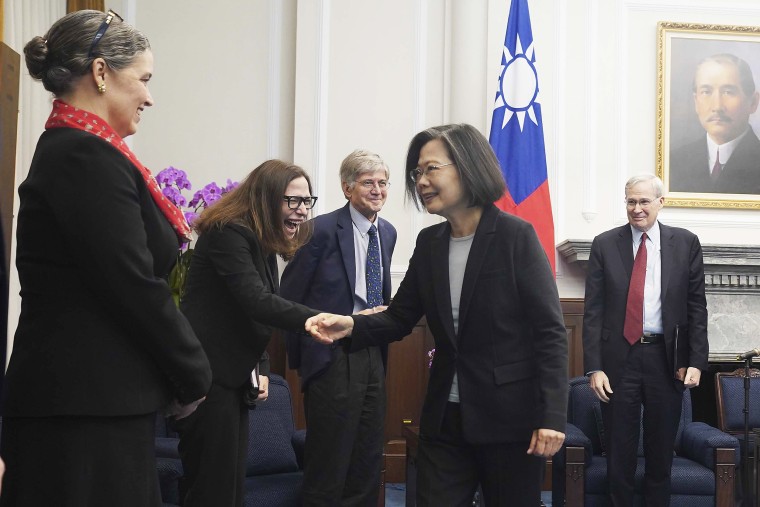U.S. delegation meets with Taiwan’s next president; Nauru switches ties to China
TAIPEI, Taiwan — A delegation of former U.S. officials met with Taiwan President Tsai Ing-wen and her newly elected successor in Taipei on Monday, two days after the self-ruling democracy voted to keep their party in power in a rebuke to Beijing.
The visit by the unofficial delegation came as Taiwan, an island 100 miles off the coast of China that Beijing claims as its territory, lost one of its few remaining diplomatic relationships, with the Pacific island nation of Nauru announcing it would switch ties to China.
A Taiwan official described the move as a “blatant challenge” to democracy by Beijing, which says that Taiwan should not have its own president and has criticized the dozens of countries congratulating the island on its successful election.
In the presidential election on Saturday, Taiwan voters elected Lai Ching-te, Tsai’s vice president, whom China had described as a separatist and a “troublemaker” and warned voters against supporting.
Lai, 64, won with 40% of the vote in a three-way race dominated by economic issues, but in which his rivals argued for closer ties with Beijing. Though his liberal Democratic Progressive Party won an unprecedented third consecutive term in power, it lost control of the legislature, which experts say could constrain Lai’s policy options when he takes office on May 20.
Lai’s victory, and China’s response to it, could test recent efforts by Beijing and Washington to repair relations that in recent years have fallen to their lowest point in decades. The status of Taiwan is among the most sensitive issues between China, which has not ruled out the use of force in achieving unification, and the United States, the island’s most important international backer.
The bipartisan U.S. delegation, which arrived in Taipei on Sunday, includes Stephen J. Hadley, who was national security adviser under President George W. Bush, and James B. Steinberg, who was deputy secretary of state under President Barack Obama. It is led by Laura Rosenberger, chair of the American Institute in Taiwan, Washington’s unofficial embassy on the island of 23 million people.
Meeting with Tsai in the presidential office, Hadley congratulated her on the success of Taiwan’s election and said the U.S. commitment to Taiwan was “rock solid.”

“Taiwan’s democracy is a shining example for the world,” he said in comments released by Tsai’s office.
Tsai said the visit demonstrated U.S. support for Taiwan’s democracy and that she hoped the U.S.-Taiwan relationship would “continue to advance and become an important driving force for regional and global prosperity and development.”
Later, in a meeting at party headquarters, Lai told the delegation that his administration would continue to defend peace and stability in the Taiwan Strait in line with Tsai’s policies and that he hoped the U.S. would continue to support Taiwan.
U.S. and Taiwan officials said the delegation was consistent with past practice and that China had not viewed previous such delegations as “escalatory.”
The Chinese Foreign Ministry said Monday that the Taiwan election was China’s “internal affair” and that no matter the result, “it will not change the basic fact that there is one China and Taiwan is part of China.”
Asked about the U.S. delegation, spokesperson Mao Ning said China “consistently opposes any form of official exchange between the U.S. and Taiwan and firmly opposes any U.S. interference in Taiwan affairs.”
On Sunday, the Chinese Foreign Ministry said a statement by Secretary of State Antony Blinken congratulating Lai sent a “gravely wrong signal” to Taiwan’s pro-independence forces and “seriously violated” the U.S. commitment “to maintaining only cultural, commercial and other unofficial relations with the people of Taiwan.”
Mao also said Monday that China “welcomes and appreciates” Nauru’s decision to sever diplomatic ties with Taiwan and recognize Beijing instead, saying it “once again shows that this is where global opinion trends.”
Nauru said earlier Monday that it would resume full diplomatic relations with Beijing “in the best interests” of the country and its 12,500 people. Nauru previously recognized Beijing from 2002 to 2005 before switching back to Taipei, which competes with Beijing for support through development aid and other incentives.
Though China’s negotiations with Nauru have been underway for some time, Taiwan’s Ministry of Foreign Affairs said the timing of the announcement was designed to offend Taiwan and felt “like an ambush.”
“My government hereby condemns in the strongest terms the hegemony of centralized China over democratic Taiwan…
Read More: U.S. delegation meets with Taiwan’s next president; Nauru switches ties to China

